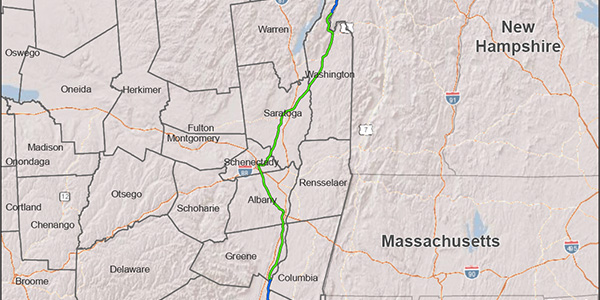FERC has authorized the owners of the 1,000-MW Champlain Hudson Power Express (CHPE) project to charge negotiated transmission rates to carry Canadian hydropower to New York City.
The commission’s May 29 order also granted the project developer’s request for waiver of certain reporting requirements (ER20-1214).
The $3 billion high-voltage direct current (HVDC) merchant transmission proposal has succeeded in allying two Democrats who have not always got along well — New York City Mayor Bill de Blasio and Gov. Andrew Cuomo, though each in his own way has championed clean energy. (See Cuomo Sets New York’s Green Goals for 2020.)
CHPE is owned by TDI-USA Holdings (TDI), which is in turn majority-owned by the investment firm Blackstone Group. Despite controlling $571 billion in assets, Blackstone does not own or control any existing electric transmission or distribution facilities in the markets operated by NYISO or Hydro-Québec.
Under commission precedent, merchant transmission projects differ from those of traditional public utilities in that the developers assume the full market risk of a project and have no captive customers from which to recover costs. Thus, the commission has allowed some such projects to be priced based on negotiated rates and has granted waivers of certain requirements.
FERC acknowledged CHPE’s commitment to turn over operational control of the project to NYISO, comply with all applicable reliability requirements and provide NYISO with all required information necessary for its regional transmission planning process pursuant to Order 1000. The commission also noted that CHPE will retain “an experienced third-party independent expert” to advise the company on its open solicitation and capacity allocation process in order to ensure that its solicitation process is not “unduly discriminatory and preferential.”
“We will, however, reserve judgment on whether the open solicitation and capacity allocation process once implemented are not unduly discriminatory, pending CHPE making a compliance filing within 30 days of the close of its open solicitation process,” the commission said.
The commission also granted CHPE’s request for waiver of Part 141 of the commission’s regulations, including the Form No. 1 annual reporting requirement for electric utilities, noting it has previously granted such waivers for other merchant transmission owners.
The commission also granted CHPE waiver of the full reporting requirements of Subparts B and C of Part 35 of FERC regulations, with the exception of sections 35.12(a), 35.13(b), 35.15 and 35.16.
Gov. Cuomo has recently spoken in favor of the CHPE project, prompting a swift protest from the Independent Power Producers of New York (IPPNY).
“This line is both unnecessary, given in-state developer demand, and provides no environmental benefit,” said IPPNY President and CEO Gavin J. Donohue in a statement.
IPPNY in January released a study it commissioned from Energyzt showing that “the purchase of hydropower over CHPE will not result in reduced global emissions of carbon dioxide – and may even increase overall carbon emissions.”
“Spending more than $3 billion to support the profiteering of a Canadian company on a project that will not revitalize the state’s economy and will not actually provide an environmental benefit is a mistake,” Donohue said. “Expanding New York’s own renewable energy industry will allow for guaranteed emissions reductions while creating in-state jobs.”




